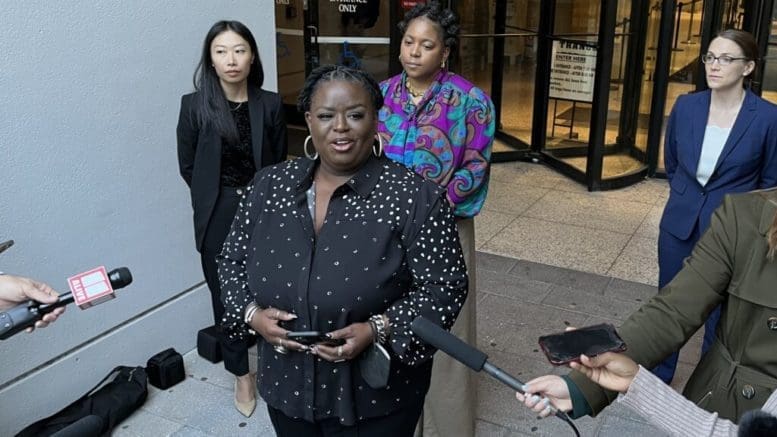by Jill Nolin, Georgia Recorder [This article first appeared in the Georgia Recorder, republished with permission]
October 25, 2022
A Fulton County judge began to hear arguments Monday on the constitutionality of Georgia’s six-week abortion ban, but a decision won’t come until after the Nov. 8 midterm election.
The two-day trial will continue Tuesday at the Fulton County courthouse with Fulton County Superior Court Judge Robert C. I. McBurney presiding over the case. Attorneys for the state tried unsuccessfully to delay the hearing.
“I set an aggressive schedule because this is an issue that needs attention now, and not in three months. It probably needed attention three months ago, but here we are,” McBurney said.
Georgia’s 2019 law had been on hold until the U.S. Supreme Court overturned Roe v. Wade this summer, setting the stage for the 11th Circuit Court of Appeals to allow the state’s law to take effect in July.
The American Civil Liberties Union of Georgia filed a new lawsuit in July on behalf of abortion providers and advocates that argues the law violates the state’s constitutional right to privacy and that lawmakers should have to start from scratch – and let voters weigh in.
The law dramatically shrunk the timeframe for someone to obtain an abortion from about 20 weeks down to about six weeks, when fetal cardiac activity can be detected. That is before many women know they are pregnant.
A few narrow exceptions are allowed, including in the case of rape or incest if a police report has been filed or in the case of a medical emergency that threatens the life of the mother.
Julia Kaye, staff attorney with the American Civil Liberties Union’s Reproductive Freedom Project, argued in court the law is far too restrictive. As an example, she pointed to lawmakers’ decision to exclude a “life-threatening psychiatric emergency” from the medical emergency exception.
“The state is saying even if you are going to commit suicide unless you can end this pregnancy, tough luck,” Kaye said.
Samantha Meltzer-Brody, who chairs the Department of Psychiatry at University of North Carolina and who specializes in reproductive psychiatry, testified Monday that it was wrong to treat psychiatric illnesses differently than medical emergencies.
“The idea that we’re going to exclude psychiatric illness, which is a medical illness, to me is just an enormous injustice and will result in women dying,” Meltzer-Brody said.
The attorneys for the state called such examples “edge” scenarios and questioned the impact of factors like a person’s distance to health care services and the suicide rate among pregnant women.
“In the same way that we wouldn’t let someone commit a crime of some other sort in order to deal with their psychiatric issues, we’re not going to let them commit this particular crime because we think that there are much better and other ways of solving that problem,” state solicitor general Stephen Petrany said.
The state is pushing the judge to dismiss the case outright. Petrany argued there is a no right to privacy because the embryo – which lawmakers granted personhood status – is affected.
“There are a lot of reasons why a privacy right might not be implicated but the one that’s absolutely clear is if it’s affecting some third party, and that’s what the General Assembly decided, is that this is affecting a third party, and they want to protect that third party. And to us, that’s really just the end of the case,” he said.
McBurney denied the plaintiffs’ earlier request to block the law, saying he did not have the ability to do so.
The new abortion restrictions have proven unpopular with most Georgians. Nearly 62% of respondents said they oppose the law, according to a poll released this month. Black respondents were the most adamantly against it, with 86.4% of them saying they firmly disapprove of the law.
Democrats have seized on the issue in hopes of rallying their supporters to the polls while Republican officials have largely tried to steer clear of the issue on the campaign trail.
Georgia Recorder is part of States Newsroom, a network of news bureaus supported by grants and a coalition of donors as a 501c(3) public charity. Georgia Recorder maintains editorial independence. Contact Editor John McCosh for questions: info@georgiarecorder.com. Follow Georgia Recorder on Facebook and Twitter.
